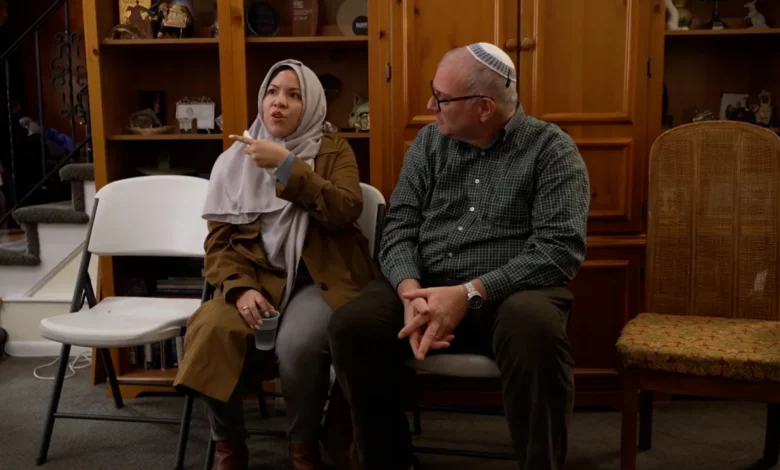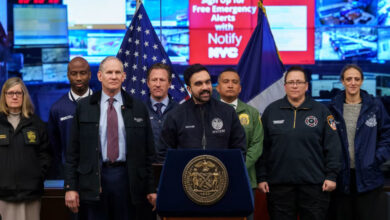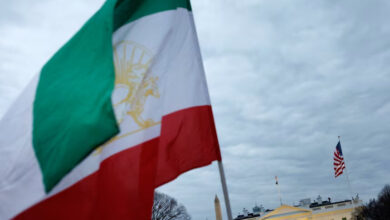
In the days following the October 7 Hamas attack on Israel, Lisa Kaplan-Miller’s WhatsApp group fell uncharacteristically silent.
Kaplan-Miller said she first joined the Sisterhood of Salaam Shalom, an interfaith organization that was founded by a Muslim and a Jewish woman in suburban New Jersey, shortly after the 2016 election. She wanted to discover similarities between the two religions and combat her own misconceptions, she said.
Members of the sisterhood meet regularly to learn about one another’s cultures, work on volunteer projects for Muslim and Jewish charities and plan trips around the world.
But the war, Kaplan-Miller said, has shifted their normally lively dynamic, morphing their collective grief into a heavy silence. For Kaplan-Miller, conversation – and perhaps confrontation – felt unavoidable.
“We truly had no choice if we wanted the chapter to continue,” she said.
As the war between Israel and Hamas in Gaza rages, many interfaith groups in the US – whose members have spent years building lasting friendships across religious divides – tell CNN the conflict has renewed their determination to draw closer together.
“It’s just like in a marriage. When you have a relationship, you make a promise you will stay with your partner forever,” said Mohammed Alhomsi, the Muslim chair of the North Jersey chapter of the Interfaith Encounter Association.
“In that same way, we have devoted ourselves together as human beings.”
Crossing divides
For years, members of the Interfaith Encounter Association have celebrated holidays together and learned about each other’s traditions. Alhomsi said he can comfortably eat at the homes of his Jewish friends, knowing everything will be Kosher.
Joan Goldstein, the Jewish chair of the group’s chapter in North Jersey, has attended Ramadan celebrations throughout the years — although she said she hasn’t been able to do the full fast yet and still drinks water.
“At the end of the day, Jews and Muslims are cousins,” Alhomsi said.
After learning about the October 7 Hamas attack, Goldstein said she felt overwhelmed and confused at how communities could see the Hamas attack in such different lights.
In that moment, she realized she wanted to talk to someone she knew and loved.
So, she called her “sister,” Btissam Alhomsi, Mohammed’s wife.
“If we didn’t have the connection we had, we would keep walking around in the world with this assumption that was a little misguided and a little incorrect and a little one sided,” Goldstein said.
“We don’t always see eye-to-eye,” she added. “But that doesn’t diminish our love for each other.”

Btissam said she also felt drawn to Goldstein in the days after the war began.
“We worked with one thing – and it’s very important that a lot of people miss – the love and respect between a Muslim and a Jew,” she said. “I don’t care where she comes from. She loves me. She doesn’t care where I come from and what I believe.”
In the weeks since the attack, Goldstein and Mohammed Alhomsi have also attended Zoom meetings with members of the organization from all around the world. Alhomsi said although there are a range of ethnicities, languages and religions on the call, he saw a sense of shared grieving.
“We feel so weak that there’s not much more we can do for our communities,” he said. “We don’t want hate crimes. We don’t want them to drag here into the United States where we live, where our children go to school.”
The Council on American-Islamic Relations has reported an “unprecedented” surge in reported anti-Arab and anti-Muslim bias incidents since October 7. The organization said it has received 1,283 requests for help and reports of bias in the first four weeks after the attack, compared with an average of 406 in a 29-day period last year.
Similarly, the Anti-Defamation League recorded 832 antisemitic incidents between October 7 – November 7. The group recorded 200 incidents during the same period last year.
Goldstein said she felt inspired to speak out about the surge in hate crimes at a recent city council meeting in her hometown of Fair Lawn, New Jersey, after listening to her Muslim friends discuss the importance of denouncing Islamophobia.
She used her allotted time to reflect on the Torah and described the moment when the reader is first introduced to Abraham. “Where are you?” God asks. “I am here,” Abraham responds.
Goldstein urged the council to look past the war’s bitter divides and pass two resolutions denouncing both antisemitism and Islamophobia.
“People of faith, we’re all hurting right now,” Goldstein said. “And by passing these two resolutions, we show that not only is the diversity of Fair Lawn being recognized but that people of faith have a place in Fair Lawn as well.”
Understanding each other’s pain
For many of the women in the Sisterhood of Salaam Shalom, the Israel- Hamas war is deeply personal. One member has a nephew who’s in the Israeli army. Others have Palestinian friends whose families are struggling to survive in Gaza. Kaplan-Miller said everyone feels like they have something at stake in the violence that’s unfolding.
Afroz Rasheed, a Muslim member of the group’s New York chapter, said their shared concern for each other has kept the community bonded together.
For years, the women avoided discussions about politics. Instead, they had picnics at the park and met for coffee dates. They brought religious items and pictures of their families to share in meetings. They discussed every topic that came to mind – except for the ongoing conflict between Israel and the Palestinians.
But all that changed in 2021, when violence erupted at the Al Aqsa Mosque after Israeli police raided the compound. In response, members flooded the group chat with videos and links about the bombing, but a pattern emerged – they weren’t communicating with each other.
So, the group partnered with New Ground, a Jewish-Muslim organization that specializes in interfaith discussions, to train members on how to moderate conversations.

Kaplan-Miller said many of those early conversations in 2021 revolved around understanding why each side had such a visceral reaction to the conflict.
The Jewish members learned what the Al Aqsa Mosque – a holy site where Muslims believe the Prophet Mohammed was transported during the Night Journey – meant for Muslims.
Muslim members learned how their Jewish friends often grew up with the fear of the Holocaust at the back of their minds – a fear that reignites when conflict erupts in the region.
“I really grew up steeped in the Holocaust in a way that I don’t think I brought to my consciousness,” Kaplan-Miller explained. “And so, Israel had become a more powerful symbol to me than I realized in terms of safety.”
But the conversations weren’t for everyone. Kaplan-Miller said the last time they spoke about Israel-Gaza violence, one member became so distressed, she stopped returning to the group.
The October 7 attack brought a rush of those feelings back for Muslim and Jewish members alike – feelings of anger, grief and fear.
Now, Kaplan-Miller said the conversations they’re having are a “different animal” because the violence is only getting worse.
Still, she said, the group is more determined than ever to bridge divides for the sake of their friendships. Despite their differences, group members have also found a unique understanding of each other’s pain.
Instead of talking about the politics of war, members of the sisterhood focused on their collective grief. Rasheed said the members can all agree on one thing: no one wants innocent people – regardless of background – to be hurt.
“I believe in my religion, and I believe in one thing, that any innocent life killed is a crime,” she said. “Regardless of who does it, we have no right.”
As the women shared their fears, they spoke to each other with gentleness, dedicated to being able to hold two truths and narratives at once. Tears, Kaplan-Miller said, were free-flowing.
“There’s no healing from this,” she said. “But, we were maybe soothed for the moment. A little less raw walking out than we had walked in.”
Although the war has tested friendships, Kaplan-Miller said she believes those who have embraced the challenge of communication through the conflict have found a sense of peace.
“We had an island in this ocean of tumult. It was a quiet little island we created for each other that just felt safe and calming,” she said. “This intractable problem has been going on for 70 years – we’re not going to solve it.”
“But we can maintain relationships and not lose sight of each other’s humanity.”
Correction: This story has been updated to correct the spelling of Lisa Kaplan-Miller’s last name.




